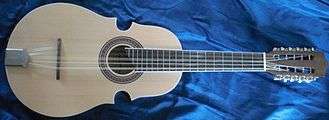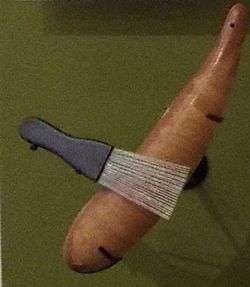Cachi Cachi music
Cachi Cachi music, also spelled Kachi Kachi, Kachi-Kachi[1] and Katchi-Katchi,[2] is a term that was coined to refer to music played by Puerto Ricans[3] in Hawaii, after they migrated to Hawaii in 1901.[4]

It is a "variation of dance music found in Hawaii"[5] which is, at times, played very fast.[6][7][3] The "influence on Hawai'i endures to this day in the musical form known as cachi cachi played on the quarto [sic] and derivative of the Puerto Rican jibaro style."[8] Jibaro means farmer in Spanish.[9] The Puerto Ricans in Hawaii "worked hard and played hard" and lightened the load for other plantation workers with their music.[4]
In Hawaii, the Puerto Ricans played their music with six-string guitar, güiro, and the Puerto Rican cuatro.[10][11] Maracas and "palitos" sticks could be heard in the music around the 1930s.[12]
More modern versions of the music may include the accordion and electric and percussion instruments such as conga drums.[13][10][14]
Etymology
According to oral tradition- video recordings by Onetake2012 and research done by Ted Solis, an ethnomusicologist, Puerto Rican get-togethers (weekend parties) often involved knife fights, which the Japanese called "cutche cutche".[15][9] A news article from 1903 mentioned Japanese were afraid of the Puerto Ricans because they often carried concealed weapons and were quarrelsome.[16] Cachi cachi music is what the people in Hawaii, who heard the Puerto Ricans playing their own music, called it. It needed a name and the people of Hawaii, specifically the Japanese plantation workers called it cachi cachi.
The Puerto Ricans, who only spoke Spanish and no English, worked alongside immigrants from the Philippines, China, but in one location their "camp" was next to the Japanese camp.[17][8] and when the Japanese heard their music, they said it sounded "scratchy".[18]
The relationships between the Japanese and Puerto Ricans working on the plantations, didn't used to be good. They lived near one another and the Puerto Ricans felt disrespected when the Japanese walked around naked or almost naked for their baths. In response, the people of Hawaii said the Puerto Ricans didn't have good bathing habits. Sometimes fights would break out and a Puerto Rican may have cut a Japanese with a machete or knife to teach him respect.[19]
Current status
In 1989, the Smithsonian Folkways Recordings, a nonprofit established for recording music by small communities from around the world, made available an album called Puerto Rican music in Hawai'i containing 16 tracks.[20][5][21] The Library of Congress, included the recording in its 1990 list of "outstanding recordings" of US folk music for meeting specific criteria including that the music emphasizes "root traditions over popular adaptations of traditional materials."[1]

William Cumpiano, a master guitarmaker and his colleagues Wilfredo Echevarría and Juan Sotomayor researched, wrote, directed and produced a short documentary about the Hawaiian Puerto Ricans and their music which includes genres such as
slack-key, décima, seís and aguinaldos. It was titled Un Canto en Otra Montaña or A Song From Another Mountain.[22]
Sonny Morales, a resident of the Big Island of Hawaii, was "famous for making cuatros".[23]
The young Auli'i Cravalho, the voice of the Disney character, Moana, in the 2016 movie by the same name, talks about growing up with cachi cachi music. She was raised on the Big Island of Hawaii.[24]
Willie K., an award-winning, Hawaiian musician from the island of Maui,[25][26] sings about it with lyrics "Cachi cachi music Makawao ...play the conga drum down in Lahaina".[6][27]
Artists
Some of the artists who played or play a variety of Puerto Rican (cach cachi) music in Hawaii:[20][28][9]
- Bobby Rodriguez
- Danny Rivera
- Darren Benitez[29][30]
- Eddie Rivera
- Ernest Rivera
- Eva Lopez[31]
- Glenn Ferreira[20]
- Juan Rodriguez
- Luciano Alvarez[9]
- Natalio Santiago[9]
- Peter Rivera
- Raymond Rodriguez
- Silva Rivera
- Tiny[7]
- Virginia Rodrigues[20]
- Willie K
The following musicians are featured in the Puerto Rican Music of Hawaii CD by the Smithsonian Folkways.[21]
- August M. Rodrigues
- Bobby Castillo
- Bonaventura Torres
- Charles Figueroa
- El Leo
- George Ayala[15]
- Johnny Lopez
- Jorge Burgos
- Juan Cabrera
- Julio Rodrigues[31]
- Leroy Joseph Pinero
- Los Caminantes
- Los Guepos
- Mi Gente
- Quique Rosario
- The Latin Five
- The Latin Gentlemen
- Tommy Valentine
See also
| Music of the United States |
|---|
References
- "American Folk Music and Folklore Recordings: A Selected List 1989". Library of Congress. Archived from the original on 2016-04-24.
- "Willi K - Kahaiali`i". Hawaiian Music Island Mele. Archived from the original on 2016-03-17.
- Ruiz, Noraliz. "Chicago: Home to the Puerto Rican Cuatro". Center for Puerto Rican Studies.
- Kreifels, Susan (December 23, 1999). "Puerto Ricans in Hawaii begin centennial celebration". Honolulu Star Bulletin. Archived from the original on March 3, 2016.
- Schwachter, Jeff. "All Music Review by Jeff Schwachter". All Music Review. Archived from the original on 2016-09-16.
- "Willie K "Kachi Kachi Music Makawao"". YouTube.
- "1 on why mp4". YouTube. onetake2012.
- George Lipsitz (2007). Footsteps in the Dark: The Hidden Histories of Popular Music. U of Minnesota Press. pp. 221–228. ISBN 978-0-8166-5019-4.
- Solis, Ted (2005). "You Shake Your Hips Too Much Diasporic Values and Hawai'i Puerto Rican Dance Culture" (PDF). Ethnomusicology. 49 (1): 75–119. Archived (PDF) from the original on 2018-06-19.
- Stahler, Kelsea (November 21, 2016). "'Moana' Star Auli'i Cravalho Is Just As Inspiring As Her Brilliant Disney Heroine". Bustle.
- "Puerto Rican Music in Hawaii". Smithsonian Folkways Recordings. Smithsonian Center for Folklife and Cultural Heritage. Archived from the original on 2017-05-20.
- Solis, Ted (2005). "You Shake Your Hips Too Much Diasporic Values and Hawai'i Puerto Rican Dance Culture" (PDF). Ethnomusicology. 49 (1): 75–119. Archived (PDF) from the original on 2018-06-19.
- Schwachter, Jeff. "All Music Review by Jeff Schwachter". All Music Review. Archived from the original on 2016-09-16.
- "Willie K "Kachi Kachi Music Makawao"". YouTube.
- "5 kachi name". YouTube. onetake2012.
- "The Porto Ricans". The Pacific commercial advertiser. June 11, 1903.
- "Waialua and Hale'iwa: The People Tell Their Story". University of Hawaii at Manoa, Center for Oral History.
- Reyes Schramm, Adelaida (1992). "Review: Puerto Rican Music in Hawai'i. Kachi-kachi by Ted Solis". Yearbook for Traditional Music. 24: 177–178. JSTOR 768499.
- Camacho Souza, Blase (1984). "Trabajo y Tristeza—"Work and Sorrow": The Puerto Ricans of Hawaii 1900-1902" (PDF). Hawaiian Journal of History. 18: 156–173. Archived (PDF) from the original on 2016-08-18.
- "Puerto Rican Music in Hawaii". Smithsonian Folkways Recordings. Smithsonian Center for Folklife and Cultural Heritage. Archived from the original on 2017-05-20.
- "Puerto Rican Music in Hawaii". Amazon.
- "Un Canto en Otra Montaña". The Cuatro Project. Archived from the original on 2017-01-03.
- "Aloha Boricua: Celebrating Boricuas in Hawaii". YouTube. Center for Puerto Rican Studies-Centro. March 20, 2013. Retrieved 9 March 2018.
- Stahler, Kelsea (November 21, 2016). "'Moana' Star Auli'i Cravalho Is Just As Inspiring As Her Brilliant Disney Heroine". Bustle.
- Wilma Consul (2005-02-11). "Hawaiian Music Makes Its Grammy Debut". Archived from the original on 2016-04-10.
- Wood, Ben (July 30, 2008). "Willie K is a powerhouse in show at Roosevelt High". Honolulu Star Bulletin. Archived from the original on September 12, 2015.
- Heu, Olena. "Amy Hanaiali'i and Willie K are reunited". Frolic. Archived from the original on 2016-04-22.
- "Aloha Boricua: Celebrating Boricuas in Hawaii". Center for Puerto Rican Studies.
- "Puerto Rican Hawaii". Center for Puerto Rican Studies. Archived from the original on 2018-03-09.
- Berger, John (February 8, 2008). "Island Mele Darren Benitez "Dear Mama"". Honolulu Star Bulletin. Archived from the original on September 12, 2015.
- "Chapter 5: Somebody Has to Go". Projecto del Cuarto. Archived from the original on 2016-01-13.
External links
- Rodney Pimental on YouTube is the third generation (in Hawaii) playing cachi cachi music
- Charles Figueroa on YouTube
- One Take Kachi Kachi Documentary trailer